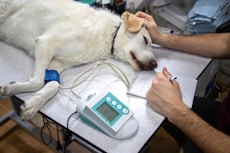 When it comes to the health and well-being of our beloved pets, it’s important to know when to seek emergency care. Just like humans, dogs and cats can experience medical emergencies that require immediate attention. In fact, according to recent statistics, 1 in 3 pets require emergency veterinary treatment every year.
When it comes to the health and well-being of our beloved pets, it’s important to know when to seek emergency care. Just like humans, dogs and cats can experience medical emergencies that require immediate attention. In fact, according to recent statistics, 1 in 3 pets require emergency veterinary treatment every year.
These situations can be stressful and overwhelming, but being prepared and knowing what signs to look out for can make all the difference. In this blog post, we will discuss when you should seek emergency pet care for your dog or cat, the signs and symptoms to watch out for, and the importance of urgent veterinary services.
Signs of a Pet Emergency:
-
Difficulty Breathing:
One of the most serious signs of a pet emergency is difficulty breathing. If your dog or cat struggles to breathe, has a rapid breathing rate, or is gasping for air, it’s crucial to seek immediate veterinary care. This pet emergency situation could indicate a serious respiratory problem or even a life-threatening condition.
Various factors, including allergies, infections, pneumonia, heart conditions, or obstructions in the airways can cause difficulty breathing in pets. Any restraint or struggle in breathing warrants immediate medical attention. If left untreated, severe respiratory issues can lead to organ damage or even death. In respiratory distress, it is best to contact a veterinarian or rush your pet to the nearest emergency veterinary hospital.
-
Severe Bleeding:
In the event of severe bleeding, it is important to act quickly. Apply direct pressure to the wound with a clean cloth or bandage to help stop the bleeding. However, if the bleeding doesn’t stop or is excessive, it’s vital to seek emergency pet care. Excessive bleeding could result from trauma or an underlying medical condition that requires immediate attention.
Severe bleeding may occur due to lacerations, trauma, puncture wounds, or specific medical conditions that affect the blood’s ability to clot properly. It is crucial to remember that any prolonged or uncontrolled bleeding can rapidly lead to shock and potentially be life-threatening. Tending to an injury immediately is vital to prevent excessive blood loss and ensure the best chance of recovery for your pet.
-
Uncontrollable Vomiting or Diarrhea:
While occasional vomiting or diarrhea may not cause immediate concern, persistent or severe vomiting and diarrhea can quickly lead to dehydration and other complications. If your pet cannot keep fluids down or is experiencing frequent episodes of diarrhea, it’s important to seek veterinary care. These symptoms could indicate a serious gastrointestinal issue or toxin ingestion.
Uncontrollable vomiting and diarrhea can be signs of various underlying issues, including gastrointestinal infections, blockages, ingestion of harmful substances, or even organ failure. It is crucial to identify the cause of these symptoms and provide the necessary treatment and supportive care to prevent further complications.
When to Take Your Pet to the Vet:
-
Trauma or Injury:
If your pet has been involved in an accident or has suffered a traumatic injury, it’s critical to seek emergency veterinary care. This includes incidents such as being hit by a car, falling from a height, or being attacked by another animal. Even if your pet appears fine initially, internal injuries or fractures may not be immediately apparent and require immediate attention.
In situations involving trauma or injury, it is best to err on the side of caution and seek veterinary care immediately. Internal injuries, broken bones, or head trauma can have severe consequences and may not be obvious to the untrained eye. Prompt medical attention can ensure a proper evaluation, pain management, and appropriate treatment to prevent further complications and promote a speedy recovery for your pet.
-
Sudden Behavioral Changes:
If your normally energetic and sociable pet suddenly becomes withdrawn, aggressive, or displays unusual behavior, it’s important to consult a veterinarian. Sudden changes in behavior could indicate underlying medical issues such as pain, neurological problems, or even poisoning. Timely intervention can prevent further complications and ensure the well-being of your furry friend.
Sudden behavioral changes such as aggression, unresponsiveness, excessive fear or anxiety, or disorientation can indicate various underlying health issues. These could include conditions such as urinary tract infections, neurological disorders, organ dysfunction, or exposure to toxins or poisonous substances. As pet owners, it is crucial to observe and recognize any sudden deviations from your pet’s normal behavior and seek professional advice to ensure their health and safety.
-
Ingestion of Toxic Substances:
Pets are naturally curious creatures, and they may ingest toxic substances without our knowledge. Suppose you suspect that your pet has ingested a toxic substance such as household chemicals, plants, medications, or human food that is toxic to animals. In that case, it’s crucial to seek emergency pet care immediately. Some toxic substances can have life-threatening effects and require immediate treatment to minimize the damage.
The ingestion of toxic substances can happen unexpectedly, and the consequences can be severe. Many common household items and foods are toxic to pets, including chocolate, certain medications, pesticides, insecticides, and various plants. Prompt action is necessary to prevent the toxins from being absorbed and causing organ damage or failure. Contacting a veterinarian or poison control center immediately can help provide life-saving advice and instructions tailored to your pet’s specific situation.
Urgent Pet Care and Emergency Vet Services:
In cases where immediate medical attention is necessary, it’s important to have access to emergency vet services. Many veterinary hospitals and clinics offer emergency vet services with extended hours or even around-the-clock care. These specialized facilities are equipped to handle emergencies and have the resources to provide timely and life-saving treatment for your furry friend.
Urgent pet care services play a vital role in ensuring that your pet receives the necessary care when time is of the essence. These facilities are staffed with trained veterinary professionals who specialize in emergency medicine. They can access advanced diagnostic equipment, surgical procedures, and supportive care measures to stabilize and treat critical conditions. It’s crucial to familiarize yourself with the closest emergency veterinary hospital and keep their contact information readily accessible in emergencies.
Knowing when to seek emergency pet care is crucial for the health and well-being of your beloved dog or cat. By being aware of the signs and symptoms of a pet emergency and understanding when to take your pet to the vet, you can ensure that they receive the necessary care in a timely manner.
If you suspect that your pet is experiencing a medical emergency, don’t wait. Contact our emergency vet services or services page for more information on urgent pet care. Your furry friend’s life may depend on it!

